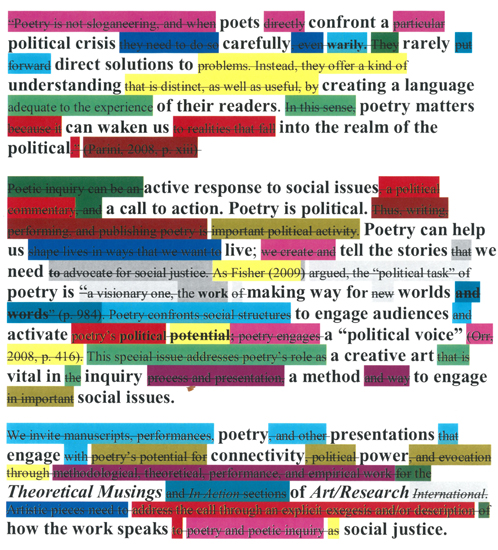“Follow Through”: Poetic Representation of Action Planning for Social Justice
DOI:
https://doi.org/10.18432/ari29248Keywords:
social justice, found poetry, arts-based research, higher education, campus climateAbstract
During an historic semester of student led protests for social justice, the University College of Education (pseudonym) facilitated an action planning session for diversity, inclusion, and social justice. This paper is guided by the question, how can data gathered from an action planning meeting on diversity, inclusion, and social justice be a/r/tographically (Irwin & De Cosson, 2004) represented to support self-awareness and transformative learning experiences? The four co-authors engaged in poetic representation (Ward, 2011) and describe how the data analysis and poem construction yielded opportunities for critical reflection in pursuit of educational equity. This work calls for continued dialogue, action, and emotional commitment to address issues of marginalization in education. The potential of arts-based research to help mediate transformative and lifelong learning regarding diversity and inclusion are discussed.References
Bonilla-Silva, E. (2010). Racism without racists: Color-blind racism and the persistence of racial inequality in the United States. Lanham, MD: Rowman & Littlefield.
Halualani, R.T., Haiker, H., & Lancaster, (2010). Mapping diversity efforts as inquiry. Journal of Higher Education Policy, 32(2), 127-136 doi: 10.1080/13600800903575439 http://www.tandfonline.com/doi/abs/10.1080/13600800903575439
Hartocollis, A. (2016). College students protest, alumni’s fondness fades and checks shrink. The New York Times. Retrieved from, https://www.nytimes.com/2016/08/05/us/college-protests-alumni-donations.html
Hartocollis, A. & Bidgood, J. (2015). Racial discrimination protests ignite at colleges across the U.S. The New York Times. Retrieved from, https://www.nytimes.com/2015/11/12/us/racial-discrimination-protests-ignite-at-colleges-across-the-us.html
Hurtado, S. (1992). The campus racial climate: Contexts of conflict. The Journal of Higher Education, 63(5), 539-569. doi: 10.1080/00221546.1992.11778388
Hurtado, S., Milem, J., Clayton-Pedersen, A. & Allen, W. (1999). Enacting diverse learning environments: Improving the climate for racial/ethnic diversity in higher education. Washington, DC: Office of Educational Improvement
Leavy, P. (2009). Method meets art: Arts based research practice. New York, NY: The Guilford Press
Meyer, M. (2017). Concrete research poetry: A visual representation of metaphor. Art/Research International: A Transdisciplinary Journal, 2(1), 32-57. doi: 10.18432/a.r.i..v2i1.28766
https://ejournals.library.ualberta.ca/index.php/ari/article/view/28766
Mezirow, J. (1998). On critical reflection. Adult Education Quarterly, 48(3), 185-198. http://journals.sagepub.com/doi/abs/10.1177/074171369804800305
McKinley, E. (2017). UM system hired a high-profile PR firm for damage control after fall 2015. The Columbia Missourian. Retrieved from: https://www.columbiamissourian.com/news/higher_education/um-system-hired-a-high-profile-pr-firm-for-damage/article_1abe8dc6-8118-11e7-b5cf-d32968eea06d.html
Nguyen, A. & Dragga, A. (2016). Campus free speech presents both legal and PR challenges for colleges. The New England Journal of Higher Education. Retrieved from http://www.nebhe.org/thejournal/campus-free-speech-presents-both-legal-and-pr-challenges-for-colleges/
Radloff, T. D. & Evans, N. (2003). The social construction of prejudice among Black and White college students. NASPA Journal, 40(2), 1-16. doi: 10.2202/1949-6605.1222
Prendergast, M. (2006). Found poetry as literature review: Research poems on audience and performance. Qualitative Inquiry, 12(2), 369-388. doi: 10.1177/1077800405284601
http://journals.sagepub.com/doi/pdf/10.1177/1077800405284601
Irwin, R.L & A. de Cosson (Eds.), A/r/tography: Rendering self through arts-based living inquiry. Vancouver, BC: Pacific Educational Press
Ward, A. (2011). "Bringing the message forward": Using poetic re-presentation to solve research dilemmas. Qualitative Inquiry, 17(4), 355-363. doi:10.1177/1077800411401198
http://journals.sagepub.com/doi/pdf/10.1177/1077800411401198
Wong, A. & Green, A. (2016). Campus politics: A cheat sheet. The Atlantic. Retrieved
from: https://www.theatlantic.com/education/archive/2016/04/campus-protest-roundup/417570/
Published
How to Cite
Issue
Section
License
Copyright (c) 2018 Art/Research International: A Transdisciplinary Journal

This work is licensed under a Creative Commons Attribution-NonCommercial-NoDerivatives 4.0 International License.
Authors who publish with Art/Research International agree to the following terms:
a. Authors retain copyright and grant the journal right of first publication and the right to sublicense the Contribution, in the form in which it is published by the journal, to others under the terms and conditions of the of the Creative Commons Attribution-NonCommercial-NoDerivs (CC BY-NC-ND) that allows others to download the work and share the work with others with an acknowledgement of the work's authorship and initial publication in this journal, but they cannot change the work in any way or use any part of the work commercially.
b. Authors are able to enter into separate, additional contractual arrangements for the non-exclusive public distribution and display of the journal's published version of the work (e.g., post it to an institutional repository or publish it in a book), with an acknowledgement of its initial publication in this journal.
c. Authors are permitted and encouraged to post their work online (e.g., in institutional repositories or on their website) prior to and during the submission process, as it can lead to productive exchanges, as well as earlier and greater citation of published work (See The Effect of Open Access).
d. Authors wishing to include items (such as images or other media, or any creative works of others whether previously published or not) must contact the original copyright holder to obtain explicit permission to publish these items in Art/Research International. Writing permission should include: the title(s) of any copyrighted work, original place of publication if applicable, and an acknowledgement of having read Art/Research International's copyright notice. Authors are responsible for obtaining this permission and keeping it in their own records for later verification.



